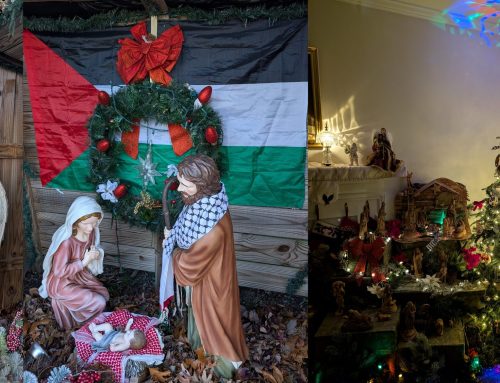.jpg) HCEF, in partnership with the Catholic Relief Services (CRS), and Holy Land Handicraft Cooperative Society (HLCS) directed its efforts toward aiding handicraft workshops in Palestine through the new Handicraft Workshop Development program. Continuing its history of supporting handicrafts and artisans in Palestine, HCEF officially completed the pilot stage of its Handicraft Workshop Development.
HCEF, in partnership with the Catholic Relief Services (CRS), and Holy Land Handicraft Cooperative Society (HLCS) directed its efforts toward aiding handicraft workshops in Palestine through the new Handicraft Workshop Development program. Continuing its history of supporting handicrafts and artisans in Palestine, HCEF officially completed the pilot stage of its Handicraft Workshop Development.Sir Rateb Rabie, President/CEO of HCEF commented: "The beauty of the project is that it is a joint effort of three partners (HCEF, CRS, and HLCS) who brought their respective expertise and resources to serve Palestinian craftsmen in order to make them efficient workers with high quality production. This program could not exist without the joint support of all partners."
For 15 years, HCEF has been involved with helping handicraft workers improve productivity and marketability of their crafts. In the past, HCEF worked to open new markets for artisans' products and advised workshops about the need for quality control and improved packaging.
A source of pride and economic welfare for the Palestinian people, handicraft workshops need help in preserving their vital tradition. Unfortunately, while artisans produce beautiful works, their health and safety are put at risk by their work environments. They utilize inefficient equipment and breathe in fine particles as they work, leading to large health costs down the line.
- Working to renovate workshops and install straining and suction systems, and
- Raising awareness among artisans regarding the health costs of their work and the steps they can take to improve their working conditions.
 Karam Iseed, owner of a mother of pearl workshop, gave his thoughts about the program: "There is definitely a big difference from before. In the past, dust would be everywhere in the workshop, along the walls and floor, and throughout the air. My workers and I would breathe in the dust every time we entered the shop. Now there is little to no dust.
Karam Iseed, owner of a mother of pearl workshop, gave his thoughts about the program: "There is definitely a big difference from before. In the past, dust would be everywhere in the workshop, along the walls and floor, and throughout the air. My workers and I would breathe in the dust every time we entered the shop. Now there is little to no dust.There is no smell. The walls are clean. I can enter and work in normal clothes without worrying about getting them dirty. And, most importantly, I am no longer concerned about my health since I'm not breathing in any more dust. I used to take special medicine for breathing, but now I've been able to stop taking the medicine!"
For more information please visit our website www.hcef.org or contact HCEF Communication Officer Michelle Munjanattu in Washington (mmunjanattu@hcef.org).

.jpg)
.jpg)
.jpg)
.jpg)
.jpg)
.jpg)
